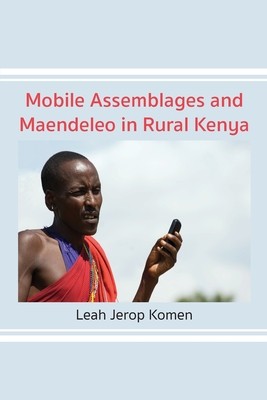
- We will send in 10–14 business days.
- Author: Leah Jerop Komen
- Publisher: Langaa RPCID
- ISBN-10: 9956552844
- ISBN-13: 9789956552849
- Format: 15.2 x 22.9 x 1.1 cm, softcover
- Language: English
- SAVE -10% with code: EXTRA
Reviews
Description
In this book, Leah Komen explores the impact of mobile telephony on the lives of people in rural Kenya. The book analyses the outcomes of complex intersections and interactions between mobile phones, individuals, and the broader society as distinct from the traditional cause-effect relationships in the discourse of development in the changing world. It subverts the traditional notion of synchronic development that ignores target populations' involvement in decision-making and sees development from the lens of developed economies where information and communication technologies like mobile telephones have originated. Komen's analysis advances a diachronic type of development that focuses on human technology's interrelationships instead of the synchronic model that privileges technology as engendering social transformations and development. The diachronic model is fundamentally Maendeleo, a Swahili term denoting process, participation, progress, and growth, and views social transformations and development as an interaction between mobile telephony users and their specific contexts. The book argues that the mobile phone has become an increasingly personalised device. It encourages a sense of community through the sharing of the device by multiple users, promotes co-presence and interpersonal communication, enhances kinship ties and social connectedness, and creates new ways of organising and conducting everyday socioeconomic activities. However, it also can disintegrate relationships and remodel some. This is a book about power negotiation, gender relations, cultural inclinations, and socio-economic dispositions within the context of mobile telephony's domestic use to facilitate social change and development.
EXTRA 10 % discount with code: EXTRA
The promotion ends in 19d.04:16:25
The discount code is valid when purchasing from 10 €. Discounts do not stack.
- Author: Leah Jerop Komen
- Publisher: Langaa RPCID
- ISBN-10: 9956552844
- ISBN-13: 9789956552849
- Format: 15.2 x 22.9 x 1.1 cm, softcover
- Language: English English
In this book, Leah Komen explores the impact of mobile telephony on the lives of people in rural Kenya. The book analyses the outcomes of complex intersections and interactions between mobile phones, individuals, and the broader society as distinct from the traditional cause-effect relationships in the discourse of development in the changing world. It subverts the traditional notion of synchronic development that ignores target populations' involvement in decision-making and sees development from the lens of developed economies where information and communication technologies like mobile telephones have originated. Komen's analysis advances a diachronic type of development that focuses on human technology's interrelationships instead of the synchronic model that privileges technology as engendering social transformations and development. The diachronic model is fundamentally Maendeleo, a Swahili term denoting process, participation, progress, and growth, and views social transformations and development as an interaction between mobile telephony users and their specific contexts. The book argues that the mobile phone has become an increasingly personalised device. It encourages a sense of community through the sharing of the device by multiple users, promotes co-presence and interpersonal communication, enhances kinship ties and social connectedness, and creates new ways of organising and conducting everyday socioeconomic activities. However, it also can disintegrate relationships and remodel some. This is a book about power negotiation, gender relations, cultural inclinations, and socio-economic dispositions within the context of mobile telephony's domestic use to facilitate social change and development.


Reviews